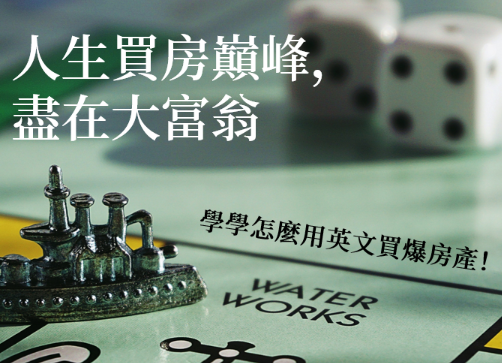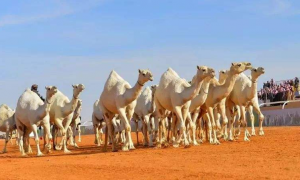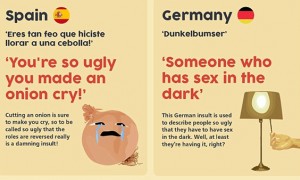趁着 Henry 远从美国来找 Bob 玩,Bob 约了 Sofia,打算三个人一起玩大富翁,度过愉快的下午。
(At Bob’s place)
(在 Bob 家)
Henry: Bro, you have the Chinese version of Monopoly! You’ll have to translate it for me.
Henry:兄弟,你的大富翁是中文版的!你必须帮我翻译。
Bob: Haha take it easy. Sofia. Which token do you want?
Bob:哈哈放轻松。 Sofia,妳想要哪个棋子?
Sofia: I want this rubber duck.
Sofia:我想要这只橡胶鸭。
Henry: I’ll take this boot.
Henry:我要这只靴子。
Bob: Okay, then I’ll be this car.
Bob:好,那我就当这辆车。
Sofia: Can I be the banker? I love dealing with money, you know.
Sofia:我可以当银行家吗?你知道的,我很喜欢处理钱。
Bob: Sure. (Sofia distributing money) Henry, take the dice. You go first.
Bob:没问题。 (Sofia 发钱) Henry,拿骰子吧,你先开始。
Henry: (rolls the dice) 12… I get to pick a community chest card! Bob, could you translate it for me?
Henry:(掷骰子) 12… 我可以抽一张幸运卡! Bob,你可以帮我翻译吗?
Bob: It says… “Go directly to jail.” Sorry, bro!
Bob:上面写 … 「直接进牢」。抱歉啦兄弟!
Henry 也太衰!究竟他之后有没有成功出狱呢?我们先来来复习单字吧!
token (n.) 象征
token 意指「象征;标志」,在故事中如 Sofia 的橡胶鸭、Henry 的靴子,都是在游戏中代表他们的象征物,也就是玩大富翁会用到的棋子。除此之外,token 在英式用法中也可以用来指「礼券」,如:book token (书券)、gift token (礼券);美式用法则为 gift certificate。
I’d like you to have this box of chocolate as a token of my gratitude.
我希望你收下这盒巧克力,当做我对你的感谢。
Mary received a 200-dollar 7-11 token as her exchange Christmas gift.
Mary 圣诞节交换礼物收到了一张价值新台币 200 元的 7-11 礼券。

banker (n.) 银行家
bank 意指「银行」,banker 则是指「银行家」,用于游戏时,亦可指「庄家」。
His family is rich because both of his parents are successful bankers.
他家很有钱,因为他父母双方都是很成功的银行家。
dice (n.) 骰子
dice 指的就是玩大富翁不可获缺的「骰子」。常见和动词 roll 或 throw 合用,roll/throw the dice 意思是「掷骰子」。
Henry rolled the dice and got a 12.
Henry 掷骰子得到 12 点。
community chest card (n.) 命运卡
community chest 的意思是「公益金」,旧时通常用于社区需要救助者,而中文版则用「命运卡」这个名称。 「机会卡」原名则是 chance card。
游戏进行到哪了呢?我们继续看下去 …
Bob: I’ve landed on an unowned property! Banker, I’d like to buy it.
Bob:我来到了一块无地主的地产!银行家,我想买下它。
Sofia: Okay, its listed purchase price is 600 dollars. (Bob giving Sofia the money) And here’s your property.
Sofia:好,它的公定市价为 600 元。 (Bob 给 Sofia 钱) 这是你的地契。
Henry: Now I’m finally out of jail. It’s my turn to roll the dice! (rolling the dice) What! I’ve landed on your property, Bob? And the one you just bought?
Henry:现在我终于出狱了,该是我掷骰子啦! (掷骰子) 什么! Bob,我走到的这块地是你的吗?你才刚买诶!
Bob: Yes! It’s my lucky day! Henry, time to pay me rent.
Bob:没错!今天是我的幸运日! Henry,交房租啦。
Henry: Man I’m going to be bankrupt… How much is it?
Henry:老天啊我会破产 … 多少钱?
Bob: 200 dollars.
Bob:200 元。
Sofia: You can always borrow money from the banker, you know.
Sofia:你知道吧,你随时都可以向银行借钱。
Henry: Then I’ll have to pay the interest. Haha, no thanks!
Henry:那样我就要付利息了。哈哈,别了吧!
property (n.) 房地产
property 可指「房地产」,或是指「所有物;资产;财产」。常见如:personal property (私有物)、government property (政府财产)。
Public property should be shared by everyone.
公有物应该为众人共享。
rent (n.) 租金
rent 当名词时意指「租金;房租」,亦可当动词用。我们玩的中文版大富翁收的叫「过路费」,英文版的则是收租金,因此称作 rent。补充:「过路费」的英文为 toll。
Bob worked part-time to pay his rent.
Bob 打工赚钱付房租。
bankrupt (adj.) 破产的
bankrupt 为形容词,意思是「破产的」,常搭配动词 go,go banckrupt。名词形则是 bankruptcy。
Mr. Wang sold his house after he went bankrupt.
王先生破产后将他的房子卖出去。
interest (n.) 利息
这里的 interest 指的并不是常见的「兴趣」,而是指「利息」。
I’m willing to lend you some money, but you’ll have to pay it back with interest.
我很乐意借你钱,不过你必须连本带利还。







